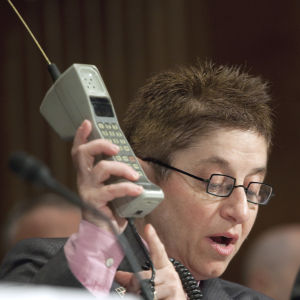A new Internal Revenue Service filing by one of the biggest interest groups in Washington’s years-long net neutrality battle shows there’s cash to be made off of close ties to and aggressive lobbying of the Federal Communications Commission for new regulations over the Internet, cable and data privacy.
Public Knowledge, the D.C.-based public interest group that led the charge for net neutrality leading up to last year’s Open Internet Order, received a 244 percent increase in contributions and grants in 2014, according to the non-profit’s tax-exempt IRS filing from that year.
In the year of lobbying leading up to the rules adoption last February, Public Knowledge pulled in $4,099,221 — a significant bump over 2013’s $1,679,234.
The group reported even larger gains in other contributions, gifts and grants totaling $3,045,910 in 2014, 345 percent over 2013’s $881,657.
“And, gosh, what’s happened since,” Mike Wendy, director of the communications at the industry-supported non-profit Media Freedom wrote of the filing. “Well, funny enough, some pretty significant bucket list items of [Public Knowledge] have happened, or are well in process, like net neutrality, unlock the box, and [Internet service provider] privacy restrictions, among others.”
The FCC, after some conflicting public statements and internal back-and-forth possibly influenced by the White House, voted along partisan lines last February to reclassify the Internet from an information service to a public utility under Title II of the 1996 Telecommunications Act — the same regulatory powers used to govern telephone providers, effectively bringing ISPs like AT&T and Comcast alike under FCC jurisdiction.
Along with the reclassification order, the FCC underpinned the primary rules of net neutrality, banning ISPs from blocking content, throttling web traffic and prioritizing certain traffic for specific edge providers like Netflix, which had brokered deals for faster download speeds with AT&T and Verizon prior to the rules’ adoption.
Passage of the rules has set off a flurry of regulatory rulemaking at the agency, where FCC Chairman Tom Wheeler leads his Democratic majority among the commissioners in creating new rules for how ISPs can collect and monetize user data, compelling cable providers to make their content available on third-party set-top boxes, regulating business-grade Internet and examining data usage-free programs by wireless carriers for certain content — known as zero-rating — which may pro-net neutrality groups claim run afoul of the new rules.
Wheeler’s FCC has aggressively tackled those issues since 2013 with the help of Gigi Sohn, former president and CEO of Public Knowledge from 2001 to 2013, and a counselor in Wheeler’s office since.
“I’m a little surprised that Public Knowledge would actually ask me to come here today since I stole Gigi Sohn,” Wheeler said as the keynote speaker at a Public Knowledge awards dinner in September.
“We cannot have debate, we cannot have the essence of how [James] Madison said this government would work without organizations like Public Knowledge,” he continued. “There is plenty of ambition on the other side of issues. There is plenty of ability to speak out. Plenty of voices, which many times are presented as ‘independent,’ but aren’t. But the ability of Public Knowledge, Free Press, Common Cause — that ability keeps the process on the straight and narrow. So I’m here to salute you for the job you do in making sure that ambition is countered with other ambition representing people.”
Since joining the FCC, Sohn has advanced Public Knowledge and Wheeler’s increasingly-aligned agenda with planned Twitter town halls (one of which ran afoul of FCC rules and was abruptly cancelled) and public speeches encouraging groups to engage in activism, like picketing her own boss’s house.
Sohn gave one such speech last October to Incompas, one of the trade groups pressing for new business broadband regs favoring smaller providers. The CEO of Incompas, Chip Pickering, was one of the award recipients at the Public Knowledge event keynoted by Wheeler last year.
Incompas, Google, TiVo and others, as part of the Consumer Video Choice Coalition, reported Friday more than 105,000 Americans support the FCC’s “unlock the box” campaign.
“That support was corralled thanks to a grassroots push by consumer groups and tech activists including Fight For The Future, Consumer Reports and Public Knowledge,” Politico reported Monday. “While that number is sizable it’s still far fewer comments than Americans submitted during the net neutrality proceeding,” which numbered almost four million.

